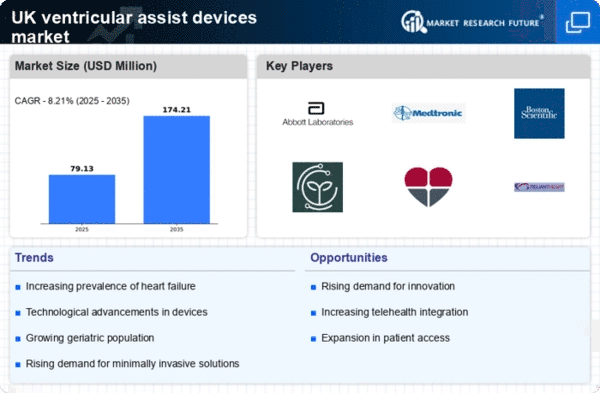Supportive Healthcare Policies
Supportive healthcare policies in the UK are fostering a conducive environment for the growth of the ventricular assist-devices market. The National Health Service (NHS) has been actively promoting the use of innovative medical technologies to improve patient outcomes. Policies that facilitate quicker access to new treatments and devices are likely to enhance the adoption of ventricular assist devices. Furthermore, reimbursement frameworks that cover the costs associated with these devices are essential for encouraging healthcare providers to incorporate them into their treatment protocols. As the regulatory landscape continues to evolve in favor of advanced cardiac care, the ventricular assist-devices market is expected to thrive, benefiting both patients and healthcare systems.
Growing Awareness of Heart Health
Public awareness campaigns regarding heart health are playing a crucial role in driving the ventricular assist-devices market. As individuals become more informed about the risks associated with heart disease and the available treatment options, there is a noticeable increase in the demand for advanced medical devices. Educational initiatives by healthcare organizations are encouraging early diagnosis and intervention, which may lead to a higher adoption rate of ventricular assist devices. This heightened awareness is likely to translate into increased patient referrals for device implantation, thereby expanding the market. Additionally, as more patients seek out advanced treatment options, healthcare providers are prompted to invest in the latest technologies, further propelling the growth of the ventricular assist-devices market.
Rising Prevalence of Heart Failure
The increasing incidence of heart failure in the UK is a primary driver for the ventricular assist-devices market. According to recent statistics, approximately 900,000 individuals in the UK are living with heart failure, a condition that often necessitates advanced treatment options. As the population ages, the prevalence of heart-related ailments is expected to rise, leading to a greater demand for ventricular assist devices. This trend is further supported by the fact that heart failure is a leading cause of hospital admissions, which places additional pressure on healthcare systems. Consequently, the ventricular assist-devices market is likely to experience growth as healthcare providers seek effective solutions to manage this chronic condition and improve patient outcomes.
Increased Funding for Cardiac Research
The ventricular assist-devices market is benefiting from increased funding directed towards cardiac research in the UK. Government initiatives and private investments are focusing on innovative solutions for heart failure management, which is likely to enhance the development of advanced ventricular assist devices. For instance, the UK government has allocated substantial resources to support research projects aimed at improving cardiac care. This influx of funding is expected to accelerate the pace of innovation within the ventricular assist-devices market, leading to the introduction of new products that meet the evolving needs of patients and healthcare providers. As a result, the market may witness a surge in new entrants and technologies, fostering a competitive landscape.
Technological Innovations in Device Design
Innovations in the design and functionality of ventricular assist devices are significantly influencing the market. Recent advancements have led to the development of smaller, more efficient devices that offer improved patient comfort and outcomes. For instance, the introduction of continuous-flow devices has revolutionized treatment options, allowing for better hemodynamic support. The market is projected to grow as these technological advancements enhance the performance and reliability of devices. Furthermore, the integration of remote monitoring capabilities is becoming increasingly common, enabling healthcare professionals to track patient progress in real-time. This trend suggests that ongoing research and development in the ventricular assist-devices market will continue to drive adoption and improve patient care.

















